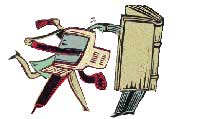|
|
|
Library is Dead.
Long Live the Library...
continued
Libraries
Stake Their Claim
Becoming
a good information consumer requires the assistance
of others, Williams says. Kornblith, who is also director of the
Oberlin Center for Technologically Enhanced Teaching, agrees that
 evaluative
skills can't be transmitted without context--or human contact. evaluative
skills can't be transmitted without context--or human contact.
Thus,
books-and-mortar libraries, far from being obsolete, may
actually turn out to be in the vanguard when it comes to
helping students--and the rest of us--sift through the infoglut.
For starters, libraries have traditionally offered a certain
degree of "information insurance." The very fact that a
book sits on a shelf is assurance that it passed muster
with a publisher and a librarian. Plus, librarians have
always helped students ask the kinds of questions that get
them to good information, starting by making sure they first
ask the right questions. "Librarians have been an unacknowledged
ally in this process of framing and re-framing a question.
No search engine will say, That's a vague question. Can
you refine it?" Kornblith says.
With
fewer people walking through the library door, however,
library administrators have had to get creative, trying
to figure out how to be a "guide at the side" where and
when students really need it, says English--like at 3 a.m.
in the dorms where students pull their all-nighters. Among
the services libraries are implementing:
-
Offering
reference services via email. At Oberlin, services would
only be available during library hours. But members of
the Five Colleges of Ohio, a consortium of schools (Denison
University, Kenyon College, Ohio Wesleyan University,
the College of Wooster, and Oberlin College) founded in
1995 with support from the Andrew W. Mellon Foundation,
are looking at pooling their resources so that some services
like these will be available electronically 24 hours a
day.
-
Creating
a Web-based tutorial. "There's this myth that libraries
are fairly easy to use," says English, "yet there's complexity
to using a major academic library." Created by the Ohio
consortium, the tutorial--available online--will cover
basic library skills and include sections on how to evaluate
information and where it comes from.
-
Designing
"friendly front ends," as Rubin calls them. Some libraries
are collecting good sources of information on the Internet
and are then putting these sources on the library's own
Web site. It's almost like they're creating a "seal-of-approval"
area on their sites, where the information is "curated"
in the same way it is in the library's printed book collection.
|
RESEARCH
AT THE
SPEED
OF THOUGHT
|
If
you haven't been to the library for a while, you'll
be surprised at how quickly you can access information
that used to take hours to track down. One company,
Questia Media, Inc., plans to launch a service in
January (www.questia.com) that will take even more
of the drudgery out of research. Check out this
gee-whiz Internet service to see just how far online
research is being taken:
Unlike
a card catalog that can be searched by title, subject,
or author, this database will search through the texts
of 50,000 classic and scholarly books for the information
you want. Questia promises other creative searching
features including clickable footnotes that take you
to the page and quotation being referenced. "If you
get a eureka moment after reading a sentence and there's
a footnote there, what percentage of the time do you
get the book? I think 1 percent is high," says Troy
Williams, Questia's CEO. "If it's one click away on
a page...you're moving through academic works at the
speed of thought." The service also offers a "reverse
footnote" feature, where you can find a bibliography
of all the sources that are referencing the page that
you're on.
|
|
|

 evaluative
skills can't be transmitted without context--or human contact.
evaluative
skills can't be transmitted without context--or human contact.